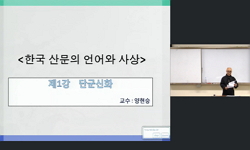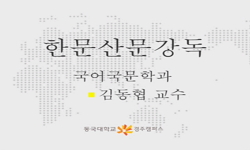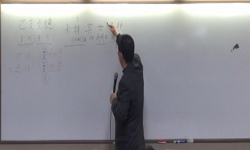This paper aims to study the concept and theory of prose poem of Korea and to examine the awareness of prose poem by the people in charge of early modern poetry. For a long time, prose poem was not properly understood by people. From the beginning of ...
http://chineseinput.net/에서 pinyin(병음)방식으로 중국어를 변환할 수 있습니다.
변환된 중국어를 복사하여 사용하시면 됩니다.
- 中文 을 입력하시려면 zhongwen을 입력하시고 space를누르시면됩니다.
- 北京 을 입력하시려면 beijing을 입력하시고 space를 누르시면 됩니다.

산문시의 형식과 근대 문학 담당층의 산문시 인식 = The Formation of Prose Poem and Perception on it by People in Charge of Modern Literature
한글로보기https://www.riss.kr/link?id=A76172740
- 저자
- 발행기관
- 학술지명
- 권호사항
-
발행연도
2006
-
작성언어
Korean
- 주제어
-
등재정보
KCI등재
-
자료형태
학술저널
- 발행기관 URL
-
수록면
239-271(33쪽)
- 제공처
- 소장기관
-
0
상세조회 -
0
다운로드
부가정보
다국어 초록 (Multilingual Abstract)
This paper aims to study the concept and theory of prose poem of Korea and to examine the awareness of prose poem by the people in charge of early modern poetry. For a long time, prose poem was not properly understood by people. From the beginning of modern literature, prose poem was introduced and written with free verse at the same time, however, meaningful poetics or studies has not been accumulated. Until today, prose poem occupies an important place in contemporary poetry, without being precisely defined nor the aesthetic rules being laid down. Prose poem has been developed through antagonism with free verse and this is not just the problem of prose poem, but it is also deeply related to the various quests and experiments of Korean poetry. Free verse has been continuously developed, on the other hand, prose poem has showed the aspect of reduction and expansion. This means that prose poem is the form in which we can confirm the reduction and expansion of the horizon of Korean modern and contemporary history of poetry. In other word, how prose poem has been created and through which process it settled down as a concrete form become not only the concern of prose poem but the concern of Korean poetry. In this aspect, the question on prose poem can, over the question of 'what is prose poem?', be the indirect answer to question on the birth and self-confirmation of Korean poetry, that is, the fundamental question of 'What was poetry and what was the poetic thing?' This paper is planned as a preparatory study to clarify this question and critical mind and paid attention especially to comments and works of 이광수(Lee, Kwangsoo), 최학송(Choi, Haksong) and 김억(Kim, Eok). This paper tries to examine that prose poem was what kind of form at that time and how it was understood within the practical writings and comments on prose poem by them. It is because 이광수 and 김억 greatly influenced on the formation of modern literature and stated their own theory of literature and poetics. In conclusion, prose poem at that time was variously used not as a fixed form, but as a prose literature, the same concept with free verse. Writings by 최학송(Choi, Haksong) were very close to aesthetical sentence rather than poetry and 김억(Kim, Eok) possessed a form of contemporary prose poem and created ‘님’, a part of Korean literary tradition, however, this ended as a one-time and fragmentary, especially exceptional attempt. There could be various reasons for these disorder and confusion, but most of all, the emphasis on musicality, that is, poetry is to recite was rooted. When 'to recite' and 'emphasis on musicality' are perceived as the essence of poetry, poetry with the form of prose poem and prose poem which would be understood as not being possessed with a fixed form as a poetry become estranged from the interest of people in charge of literature in this period.
목차 (Table of Contents)
- 1. 문제제기
- 2. 산문ㆍ산문시
- 3. 산문시의 번역과 창작
- 4. 산문문학으로서의 산문시 - 이광수와 최학송의 산문시
- 5. 자유시로서의 산문시 - 김억의 시론과 『밤과 나』
- 1. 문제제기
- 2. 산문ㆍ산문시
- 3. 산문시의 번역과 창작
- 4. 산문문학으로서의 산문시 - 이광수와 최학송의 산문시
- 5. 자유시로서의 산문시 - 김억의 시론과 『밤과 나』
- 6. 결론
- 참고문헌
- Abstract
동일학술지(권/호) 다른 논문
-
- 한국시학회
- 조영복(Cho Young-Bok)
- 2006
- KCI등재
-
『질마재 神話』에 나타난 ‘비천함(Abjection)’의 상상력
- 한국시학회
- 정끝별(Jeong Keut-Byul)
- 2006
- KCI등재
-
- 한국시학회
- 한명희(Han Myeong-hee)
- 2006
- KCI등재
-
- 한국시학회
- 나희덕(Ra Hee-Duk)
- 2006
- KCI등재




 KCI
KCI DBpia
DBpia







